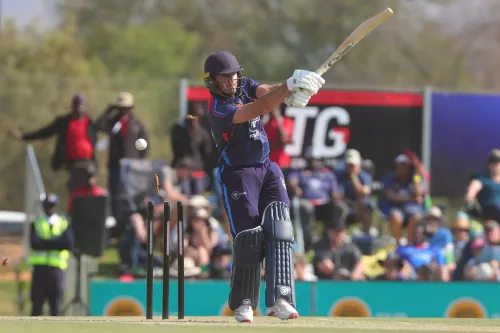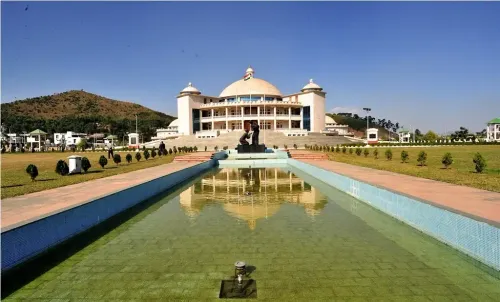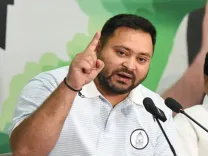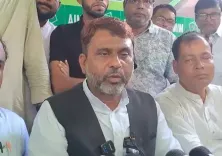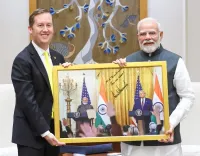Should Unintentional Financial Crimes Be Treated Differently Than Greed-Driven Ones? Ex-CJI Sanjiv Khanna
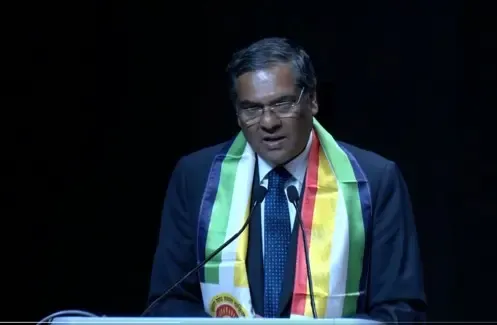
Synopsis
Key Takeaways
- Sanjiv Khanna emphasizes the need for differentiation in financial crime categorization.
- White-collar crimes motivated by greed are the most serious.
- Public trust in law enforcement is vital for societal safety.
- A collective effort to combat white-collar crime is necessary.
- The healthcare sector must address white-collar crimes with greater accountability.
New Delhi, Oct 11 (NationPress) Former Chief Justice of India Sanjiv Khanna stated that it might be essential to differentiate between unintentional financial crimes and those driven by greed during a recent conference. Speaking at the TPF-Dayitva: National Legal Conference on Combating White-Collar Crime, organized by the Terapanth Professional Forum (TPF) at Bharat Mandapam, former CJI Khanna emphasized that while ignorance of the law cannot serve as a defense, “offences committed without malicious intent should not be equated with those that are premeditated and motivated by greed.”
He categorized financial crimes, asserting that the gravest white-collar offences stem from greed, including instances of fraud, embezzlement, insider trading, money laundering, and bribery.
Khanna highlighted a common perception that law enforcement agencies are more about harassment than assistance, which discourages individuals from seeking help, thereby allowing cybercriminals to exploit this fear. “Many opt to pay their harassers instead of pursuing justice,” he lamented, advocating for a more approachable law enforcement and increased public awareness as a dual approach to tackling the problem.
He described white-collar crime as “an evolving threat that undermines the moral fabric of society,” urging for a more nuanced application of financial legislation. “Not every action or inaction with financial implications should be treated the same,” he urged, advocating for a distinction between intentional fraud, unintentional errors, and procedural lapses.
In his remarks, Khanna stated, “The justice system’s strength lies not in the severity of penalties but in the assurance of justice.” Raj Kumar Nahataa, National Convenor of TPF, added, “White-collar crime is not victimless. Every scam robs us of opportunities and hinders our progress.”
He stressed the pressing need for professionals to embrace new roles as collective whistleblowers and guardians of ethics, thereby protecting our nation’s moral wealth.
Bringing a public health viewpoint, Dr. Poonam Khetrapal, IAS (Retd) and Regional Director Emeritus, WHO South-East Asia Region, noted that white-collar crime in healthcare transcends monetary issues; it concerns life and trust. “When poor-quality care is deliberately offered, when the underprivileged are denied treatment despite eligibility, and when safety protocols are disregarded for profit, it transitions from negligence to white-collar crime,” she articulated.
Referencing a global study, Dr. Khetrapal highlighted that annually, 8.6 million preventable deaths occur due to substandard healthcare, with 1.6 million in India alone. She advocated for “robust forensic auditing, health outcome tracking, regulatory performance indicators, and judicial oversight,” asserting that accountability must “follow the money — from boardrooms to approval desks.”
From an economic perspective, Ashish Kumar Chauhan, Managing Director and CEO of the National Stock Exchange (NSE), remarked that as societies grow wealthier, “crimes become more sophisticated.” He pointed out that the ratio of violent to commercial crimes has flipped over the past two decades, with 80% now being financial or cybercrimes. “Today, theft no longer occurs from pockets but from systems. Although UPI has eliminated cash, it has not eradicated corruption; it has merely digitalized theft,” he noted.
The TPF–Dayitva Conference, attended by over a thousand professionals from various sectors, engaged in discussions on ethics, compliance, governance, and the evolving regulatory framework to combat financial crimes, aligning with India’s vision for ‘Viksit Bharat 2047.’
As the event concluded, a resounding message resonated throughout the sessions: India’s developmental journey will remain incomplete without restoring public trust and integrity in institutions. Justice Khanna summarized that white-collar crime “not only tests the limits of law but also challenges the very conscience of governance.”

